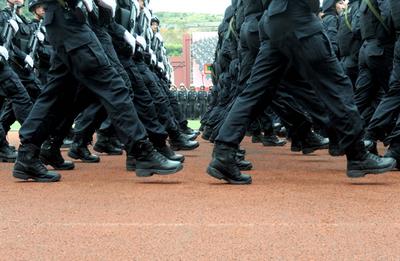Recently announced provincial-level turnover lists for the 18th Party Congress suggest that the second trend is more significant. While deputy party secretaries taking over provincial PLCs is a real trend, it has yet to become dominant; only 19 per cent of provincial PLC heads serve concurrently as deputy party secretary of the province. Given that ‘social management innovation’ has been a major policy orientation of Hu Jintao since 2011, it is not surprising that those provincial Party Secretaries whose deputies also head up PLCs have factional ties with Hu Jintao in 83 per cent of the cases.
On the other hand, only 26 per cent of police chiefs now concurrently serve as PLC secretaries, a much lower ratio than at the time of the 17th Party Congress, when the figure stood at 45 per cent. This is even more impressive at subregional levels: in Guangdong and Qinghai, for example, no municipal PLC heads are concurrently serving as police chiefs.
So, the real question is why such reform is taking place. Elite coalition politics is part of the picture. Zhou Yongkang, Secretary of the Central Politics and Law Committee, lent support to Bo Xilai, a Jiang Zemin ally who had seriously challenged the Hu-Wen line. Analysis of Zhou’s public appearances since June reveals a softening of tone, and a shift of language on social management and judicial reform in a ‘liberal’ direction. These changes imply a degree of capitulation in the elite power game. Changing the make up of PLC personnel away from police chiefs may be a manoeuvre by Hu and Wen to control Zhou by diluting his underlings’ oversight of public security. At the same time, placing deputy party secretaries in roles with oversight of the security apparatus boosts the party’s control over the portfolio.
Regime survival may also figure in this reform. Several important points can be noted. The Zhou-Bo alliance revealed that the security apparatus could serve as a platform for challenges to the party Centre. The personnel changes also demonstrate the party’s willingness to side with popular forces against local-level public-security agencies. Lingering public sympathy for Bo Xilai is being eased by his association with rogue policing methods.
In this sense, the ongoing trends mentioned above may reflect the regime’s realisation of the need to guard its own guardians. It has been evident for some time that the middle levels of the party state have come to see weiwen (stability maintenance) as downgrading their stock of governance tools.
With state-society relations increasingly fragile, the party, in order to ensure its survival, must be prepared not merely to crush protests, but also to prevent social grievances from getting into the open in the first place. The Chen Guangcheng and the Tang Hui affairs have underlined the severity of official misconduct in the security apparatus.
The policy response has been to reincorporate public security and weiwen within ‘social-management innovations’. From the point of view of judicial reform, these changes mark tentative steps toward the rule of law. PLCs regulate the procurators; police chiefs serving as secretaries are in effect both ‘players’ and ‘referees’. Removing police heads from the posts of PLC leaders is a way to institutionally ensure separation of power within the judicial structure.
According to Peking University legal-anthropologist Hou Meng, county-level PLCs may lack the social resources needed to fully function as regulators. Where the trend of assigning a deputy party secretary to lead the PLC continues to the grassroots level, the individuals in question may be better positioned to play their regulatory roles.
Finally, these personnel changes also highlight legitimisation efforts. Notably, the PLC as an institution is mentioned neither in the Constitution nor the party charter; it is legitimised by ‘documents’. A highly ranked standing-committee member (vice party secretary) taking the PLC post arguably further institutionalises the authority of this institution.
Personnel changes to PLCs cannot be examined in isolation from the overall political situation in China. The decrease in police chiefs, and increase in deputy party secretaries serving on PLCs may reduce frictions, and strengthen the judiciary’s standing. Of course, local rationalisation of the PLCs does not entail a loosening of social control. At the time of writing, municipal level police chiefs in Guangdong were given command of local PAP armed police, indicating that keeping the security apparatus in line and dealing promptly with mass incidents preoccupy the Party roughly equally.
David Kelly is Research Director at China Policy, a research and advisory company in Beijing.
Erik Wang is a policy analyst on leave from studies at the University of Notre Dame, Indiana.

